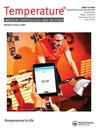在热驯化过程中,白细胞Hsp72 mRNA的转录在雄性和雌性之间没有差异
Q1 Biochemistry, Genetics and Molecular Biology
引用次数: 9
摘要
目的:耐热性是在单次或多次暴露于热应激后获得的细胞保护增强的一种获得性状态,部分特征是细胞内72kda热休克蛋白(HSP72;HSPA1A)。与男性相比,女性表现出运动诱导的HSP72降低。本研究检测了热驯化(HA)过程中热休克蛋白72信使核糖核酸(Hsp72 mRNA)转录的性别差异,以确定性别差异是否是基因转录差异的结果。方法:10名参与者(5M, 5F)在12天内进行10分钟,90分钟的控制热休克[直肠温度(3)≥38.5°C] HA疗程。通过逆转录聚合酶链反应(RT-QPCR)测量D1, D5和D10前后的白细胞Hsp72 mRNA。结果:HA表现为静息Tre(- 0.4±0.5°C)和静息心率(HR)的降低;−13±7拍。min−1](p≤0.05)。在HA期间,男性之间的ΔTre无差异(p > 0.05) (D1 = 1.5±0.2°C;D5 = 1.6±0.4℃;D10 = 1.8±0.3°C)和雌性(D1 = 1.5±0.5°C;D5 = 1.4±0.2℃;D10 = 1.8±0.3°c)。这也证明了对mRNA转录和HA的热刺激是相等的。Hsp72 mRNA表达在HA组间及男性组间无显著差异(D1 = +1.8±1.5倍;D5 = +2.0±1.0倍;D10 = +1.1±0.4倍)和雌性(D1 = +2.6±1.8倍;D5 = +1.8±1.4倍;D10 = +0.9±1.9倍)。结论:本实验表明,在控制热疗HA过程中,Hsp72 mRNA的表达在两性之间没有差异。其他地方报道的运动诱导的HSP72的性别差异可能是转录后事件的结果。本文章由计算机程序翻译,如有差异,请以英文原文为准。
Leukocyte Hsp72 mRNA transcription does not differ between males and females during heat acclimation
ABSTRACT Purpose: Thermotolerance is an acquired state of increased cytoprotection achieved following single or repeated exposures to heat stress, in part characterized by changes in the intracellular 72 kda heat shock protein (HSP72; HSPA1A). Females have demonstrated reduced exercise induced HSP72 in comparison to males. This study examined sex differences in heat shock protein 72 messenger ribonucleic acid (Hsp72 mRNA) transcription during heat acclimation (HA) to identify whether sex differences were a result of differential gene transcription. Methods: Ten participants (5M, 5F) performed 10, 90 min controlled hyperthermia [rectal temperature (Tre) ≥ 38.5°C] HA sessions over 12 d. Leukocyte Hsp72 mRNA was measured pre and post D1, D5, and D10, via Reverse transcription polymerase chain reaction (RT-QPCR). Results: HA was evidenced by a reduction in resting Tre (−0.4 ± 0.5°C) and resting heart rate [(HR); −13 ± 7 beats.min−1] following HA (p ≤ 0.05). During HA no difference (p > 0.05) was observed in ΔTre between males (D1 = 1.5 ± 0.2°C; D5 = 1.6 ± 0.4°C; D10 = 1.8 ± 0.3°C) and females (D1 = 1.5 ± 0.5°C; D5 = 1.4 ± 0.2°C; D10 = 1.8 ± 0.3°C). This was also true of mean Tre demonstrating equality of thermal stimuli for mRNA transcription and HA. There were no differences (p > 0.05) in Hsp72 mRNA expression between HA sessions or between males (D1 = +1.8 ± 1.5-fold; D5 = +2.0 ± 1.0 fold; D10 = +1.1 ± 0.4-fold) and females (D1 = +2.6 ± 1.8-fold; D5 = +1.8 ± 1.4-fold; D10 = +0.9 ± 1.9-fold). Conclusions: This experiment demonstrates that there is no difference in Hsp72 mRNA increases during HA between sexes when controlled hyperthermia HA is utilised. Gender specific differences in exercise-induced HSP72 reported elsewhere likely result from post-transcriptional events.
求助全文
通过发布文献求助,成功后即可免费获取论文全文。
去求助

 求助内容:
求助内容: 应助结果提醒方式:
应助结果提醒方式:


